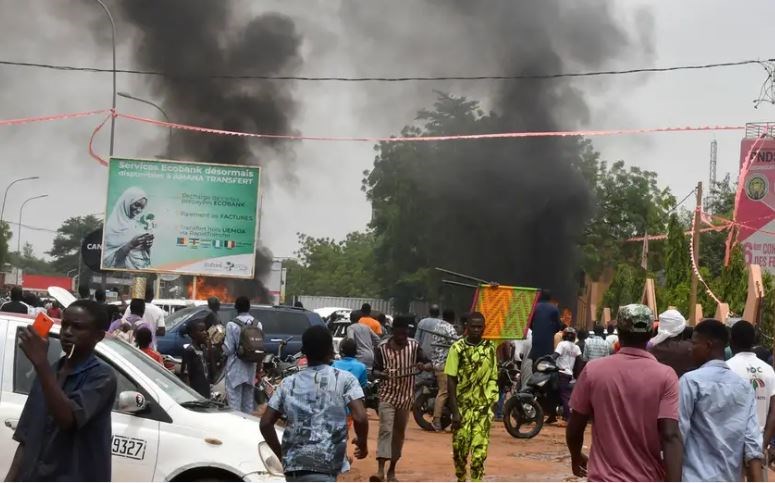Niger 'coup' not 'final' amid army support, France says
The leaders of the Niger 'coup' assert that they had gained substantial support from the military and urged for calm in the country.
-

Groups of people gathered in the capital, Niamey, on July 27, 2023 (AFP)
The leaders of the Niger "coup" asserted that they had gained substantial support from the military and urged for calm in the country. However, ex-colonizer France did not consider the "coup" as a definitive event.
French Foreign Minister Catherine Colonna suggested that there might be ways for the "coup" plotters to avoid global condemnation by bringing President Mohamed Bazoum back to power.
"If you hear me talking about an attempted coup, it's because we don't consider things final," she said. "There is still a way out if those responsible listen to the international community."
This comes after Nigerien military rebels reported on Thursday that a French military aircraft violated Niger's air border closure, which had been implemented in response to the recent coup in the country.
The National Council for the Safeguard of the Homeland, which is now in de facto control of Niger, made this claim during a televised address.
According to the rebels, the French aircraft, identified as an A400M military plane, landed at Niamey's international airport at 6:30 am local time (05:30 GMT), despite the order to close both air and land borders.
Despite being confined to his residence by his own presidential guard since the mutiny began, President Bazoum defiantly stated that the country's hard-won democratic progress would be safeguarded.
"The hard-won (democratic) gains will be safeguarded," Bazoum said on Twitter, which is being rebranded as X.
"All Nigeriens who love democracy and freedom would want this," he added.
He received backing from international organizations and allies, including Germany, the United States, and France.
Although the mutiny faced disapproval from various countries and organizations, the head of the armed forces, General Abdou Sidikou Issa, expressed his support for the mutiny leaders to prevent further confrontations.
"The military command... has decided to subscribe to the declaration made by the Defence and Security Forces... in order to avoid a deadly confrontation," he said in a statement.
Niger, a landlocked and impoverished nation, has a history of political instability, having experienced four coups since gaining independence from ex-colonizer France in 1960. The recent "coup" adds to the already troubled situation in the Sahel region of Africa, where insurgency and coups have been prevalent in neighboring countries like Mali and Burkina Faso.
The "coup" leader, Colonel Amadou Abdramane, appeared on national television, calling for calm among the population.
Demonstrations in support of the unfolding events took place, with some protesters expressing anti-French sentiments.
The big picture
The situation has raised concerns about potential instability and security risks in the region. The Economic Community of West African States (ECOWAS) demanded the immediate release of President Bazoum, asserting his legitimacy as the lawful president of Niger.
International leaders, including those from the United Nations, the United States, and Russia, have called for peaceful dialogue and the release of President Bazoum, expressing concerns about the potential impact on security and humanitarian operations in Niger.
Since the start of the Ukrainian conflict, the African continent has been swept by a wave of change fueled by a sentiment of anti-Western imperialism.
Burkina Faso and Mali, which are also part of the Sahel, have in recent years transitioned to military governments via coups by toppling Western-backed leaders.
On June 23, Niger's parliament approved a new national anthem, marking the first steps to free the country of any relics of French colonization.
France, the colonizer
In the late 1890s, France began colonizing Niger. The Sahel nation won independence in 1960 as part of a broader decolonization movement triggered by political upheavals and Paris' surrender of African territories.
France retained its colonies in Africa roughly until the 1960s, exercising its dominance over North, Western, and Equatorial Africa. Shortly after the formation of the Fifth French Republic in 1958, countries such as Algeria, Morocco, Tunisia, Benin, Burkina Faso, Cote d’Ivoire, Guinea, Mali, Mauritania, Niger, Senegal, Congo, Chad, and the Central African Republic gained independence.
Despite this fact, Paris failed to completely abandon the region, continuing to intervene in its internal affairs, including by military means.
It is worth noting that the "coup" unfolded on Wednesday when members of the Nigerien presidential guard announced on national television that they had ousted President Mohamed Bazoum. Subsequently, they closed the country's borders and imposed a curfew "until further notice."
The "coup" came shortly after the presidential guard detained President Bazoum at his residence and sealed off access to public offices in the capital city, Niamey.
Read next: Nigerien soldiers claim 'coup' successful, President Bazoum overthrown

 5 Min Read
5 Min Read








